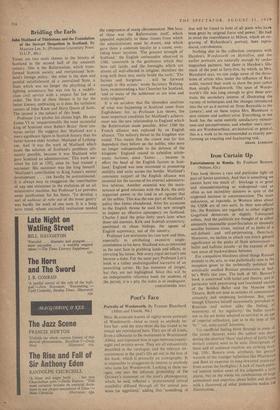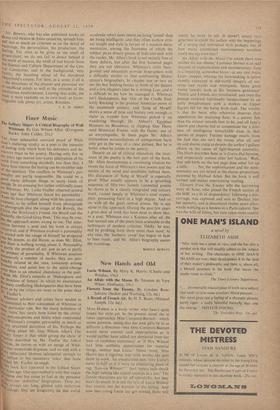Iron Curtain Up
Entertainment in Russia. By Faubion Bowers. (Nelson, 42s.)
THIS book throws a rare and particular light on part of Soviet existence. And that is something we cannot have too much of: blockage is so great and misunderstanding so widespread—and as often as not incredibly delusive in spite of the supposed increase in communication. The main unknowns, or tejecteds. in Western ideas about the USSR are of two sorts. In their non-official life, the Russians are regarded as either slightly Gogolised democrats or slightly Tolstoyised robots. And the politicals are thought of as either eminently reasonable quasi-Socialists or shrewdly sensible business rivals, instead of as limbs of a self-defined and self-perpetuating theocracy. Moreover, we incline to attach too much general significance to the peaks of State achievement- - ballet and ballistic missile—at the expense of the vast areas of backwardness between.
For compulsive blindness about things Russian extends to the arts, as was pathetically seen in the reception given to the technically polished but artistically ossified Russian productions at Sad- ler's Wells last year. The bulk of Mr. Bowers's book is concerned with ballet and theatre, and in particular with penetrating and fascinated studies of the Bolshoi Ballet and the Moscow Arts Theatre. Both are seen as temples of consummate virtuosity and unsparing lavishness. But, even though Ulanova herself occasionally provoked in Russians and author alike the feeling of monotony, of icy regularity,' the ballet stands out as the art better adapted to survival in an age of imperial orthodoxy, just as in the time of the semi-aerial' 'stamina. \
at unofficial feeling burst through in some of the junior theatres while the author was there during the abortive 'thaw' and plays of fairly high deviant content were to be seen. Descriptions of these and of audience reaction are striking read- ing. (Mr. Bowers even attributes the greater warmth of the younger ballerinas like PlisetskaYa and Bovt to response to long-thwarted yearnings from across the footlights.) A lack of much politi- cal interest makes some of his judgments a little jejune, but on the whole his combination of huge enthusiasm and expertise about ballet and drama with a disavowal of other pretensions makes for illumination. Mr. Bowers, who has also published books on dance and theatre in Asian countries, spreads him- Self not so much on criticism as on the detail of backstage, the personalities, the production, the feeling. Yet, even as he gives us the smell of grease-paint, we do not fail to detect behind it the smell of success, the whiff of bad breath from the Science and Culture Department of the Cen- tral Committee, and in the background, very faintly, the haunting odour of the murdered IVIeyerhold's corpse. For here, in a sense, it all is — the directions of the present and perennial stir to unofficial minds as well as the attitudes of the totalitarian establishment. Leaving that aside, the book is most readable on its own level, as know- ledgeable talk about art, artists, Russians.
J. E. M. ARDEN



































 Previous page
Previous page